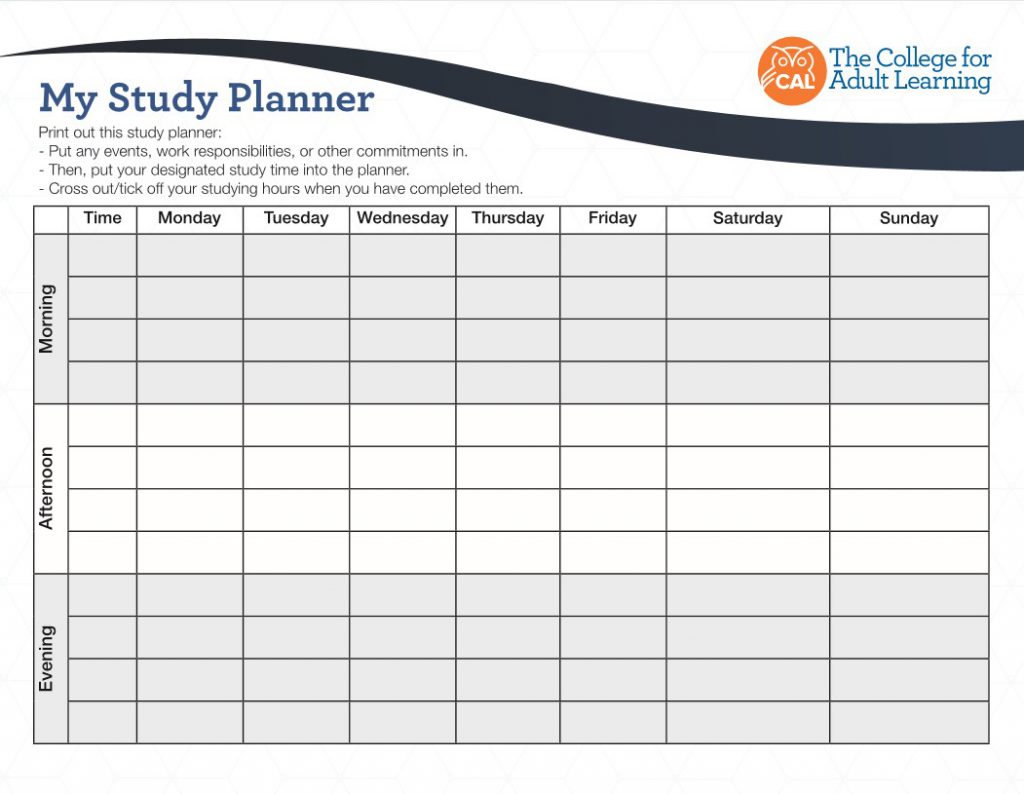
Establishing effective study habits can be the difference between completing your diploma in good time or needing to ask for an extension. While we all have varying amounts of time to dedicate to our studies, it’s how we use it that is important.
Here we’ll break down simple tips you can establish to turn yourself into a more productive student.
Using a study planner to build productivity habits
Yes, it sounds old school, but study planners are an efficient way to keep track of your week. While it may seem like pressure to follow a planner like clockwork, the opposite is true. A study planner will keep track of what you have on and will help you avoid that last-minute moment of dread when you forget that assessment, quiz or coaching call.
When you allow your day and week to be supported by your study planner, it can act as a pseudo-authority figure. You don’t have to decide whether to study or do your washing, because the decision is already made by your planner, meaning your rest time will be better utilised.
The best thing for your planner is to stick to it for a reasonable amount of time. A well-known study conducted by the ‘European Journal of Social Psychology’ concluded that it takes at least eighteen days to form a new habit, with an average of sixty-six days for most people. The more you put into strengthening your new habit muscle, the more you will get back out. Before long, you may not even need to look at your planner to know what you need to do each day, and when.
Use an Eisenhower Matrix
The Eisenhower Matrix is a very useful tool you can use for task delegation. The matrix, named after former US president Dwight David Eisenhower, prioritises tasks by urgency and importance. Over the years, it has been proven to be a very effective time management technique. The boxes organise tasks into;
- Important and Urgent (DO) – Tasks to prioritise and complete as soon as possible
- Important and Not Urgent (DECIDE) – Tasks to schedule a time to do
- Urgent and Not Important (DELEGATE) – Tasks that might come up unexpected or unplanned, tasks you may be able to get someone else to do
- Not Urgent and Not Important – Tasks that are potential time-wasters, and are best if eliminated
Organise your day or week’s tasks into this matrix, so you can get a better idea of what tasks to prioritise. This way, by the end of the day or week, you have accomplished the most necessary goals or tasks you wanted to achieve.
Download our Study Planner and Task Delegator Matrix below.
Useful study schedule ideas
Form study groups
Every time you feel the pinch of balancing your work, study and social life, chances are there’s a course-full of people feeling the same way. Networking amongst your online study groups to ask questions and find study-buddies is an effective way to lighten the load—all the while building real-world skills like communication and collaboration.
Pooling resources, proofreading each other’s work or meeting up online before assessments are easy ways to work with others in your course. We all think differently and place emphasis on different kinds of information. Study groups are an effective way of expanding your horizons and gaining a perspective on a topic you would not have otherwise obtained.
Do what makes you happy, first!
Instant gratification is the easiest way to release dopamine in your brain, making it all too easy to call a friend, play your favourite game or binge out on Netflix when you should have your head down studying. It’s important to build productive habits that navigate these temptations. As crucial as it is to schedule your work, it’s equally important to plan the things that make you happy. When you build your study planner, adopt the ‘fun-stuff first approach’. By entering the fun stuff into your calendar first, you don’t have to cheat your schedule to find the time. If a deadline is pending, and you do have to prioritise work over fun, then you can easily see where you can switch your time around.
Best productivity tips for students
Stick to your normal routine
Stick to your familiar schedule when working from home. Online students can fall into the trap of favouring work before study, as it seems more important. In those moments, remember that you are studying to improve your future career and life goals.
Create a supporting study space
A handy trick for studying at home is to create a designated study space. Your brain will get anchored to what’s expected of it in that area – which is study! When you enter your study space, you know that it’s time to get working. Avoid doing other activities like reading for fun, or chatting to your flatmate while in this space to prevent anchoring bad habits! Keep the area tidy, and add a quote or picture that inspires you to stay focused.
Take breaks
When an assignment deadline approaches, it can feel like you must put in every second on it until its due. However, the result of this stress is not usually your best work, as you grow tired and fatigued, and don’t perform at your peak. Instead, take short breaks at regular intervals to refresh and maintain your best standards. These breaks reduce your stress and stop you from pushing your limits and burning out.
Balancing your work at home with your study isn’t rocket science, most tips simply come down to common sense and dedication. When building habits, what you put in is what you will get out of it and using a study planner works the same way. Everyone is different, so be flexible and try new things until you find the productivity habits that are best for your lifestyle.
Study Planner Template and Task Delegator Template
Plan your study week, and successfully prioritise your tasks with our templates!
Download the PDF below, and select print.
Download the templates





